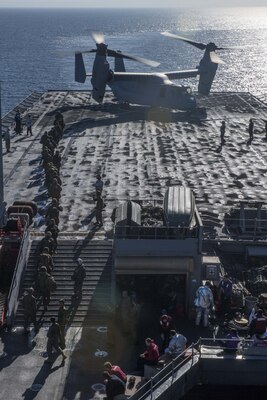By Navy Petty Officer 3rd Class Reymundo A. Villegas III,
Expeditionary Strike Group 3
PACIFIC OCEAN, Feb. 8, 2018 — The dock landing ship USS
Rushmore, with elements from the 11th Marine Expeditionary Unit and the Japan
Ground Self-Defense Force, concluded exercise Iron Fist 2018 yesterday off the
Southern California coast.
Iron Fist 2018 demonstrated more than a decade of
interoperability development and enhanced amphibious capability of Japanese and
American forces. The Rushmore provided both an amphibious and air platform for
Marine Corps and Japan Ground Self-Defense Force members to train and conduct
operations.
The amphibious phase of Iron Fist 2018 showed that the Rushmore
was able to act as a single focal point for surface, air and amphibious
operations, while nearly 300 U.S. Marines and Japanese personnel joined more
than 330 sailors aboard, officials said.
During the five-day exercise, the Rushmore launched six amphibious
assault vehicles numerous times from its well deck and conducted more than 20
flight deck landings.
Integration, Readiness
"Iron Fist is an excellent opportunity to not only show
the [Japan Ground Self-Defense Force] the importance of integrating landing
forces with amphibious warfare, but also to continue sharpening our ship's own
routine training to maintain the highest level of operational readiness,"
said Navy Cmdr. John Ryan, the Rushmore’s commander. “It provided the crew with
a unique opportunity to work with other nations' armed forces, a crucial skill
as the ship prepares for deployment.”
The culminating training event was a scenario-based
amphibious assault launched from Rushmore in coordination with an inland
helicopter assault. The exercise wrapped up with the components of 11th MEU and
Japan Maritime and Ground Self-Defense Forces departing the ship and returning
to Camp Pendleton, California.
Joint interagency and international relationships strengthen
U.S. 3rd Fleet's ability to respond quickly and effectively to crises in the
Pacific. The Japanese-U.S. alliance helps with counterterrorism, counterpiracy,
peacekeeping, capacity building, ballistic missile defense, humanitarian
assistance and disaster relief.









No comments:
Post a Comment